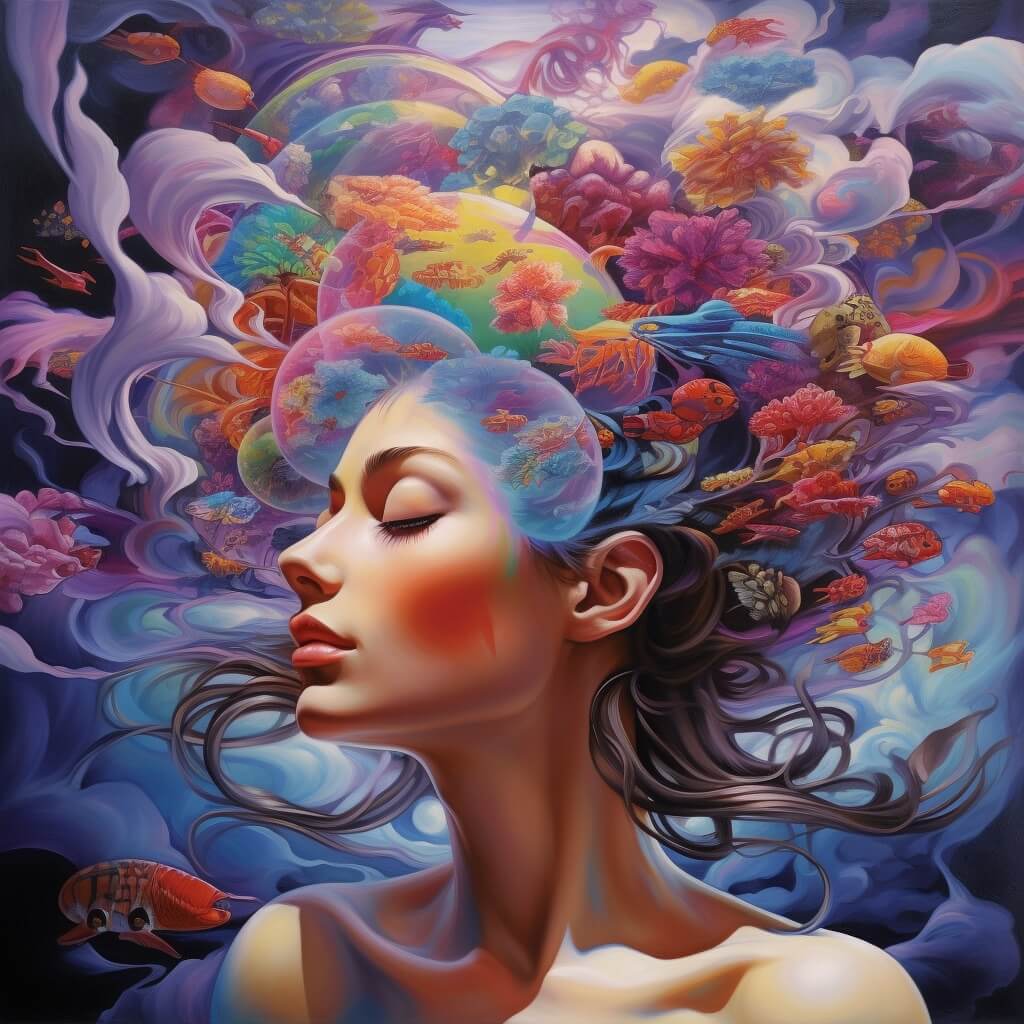In the silent embrace of the night, when the world outside fades to a whisper, our minds embark on journeys through realms both wondrous and arcane. Here, in the theater of our subconscious, unfold dreams drenched in emotions, painting tales of joy, sorrow, longing, and myriad feelings in between. These are not just mere flights of fancy; they are the emotional dreams, gateways to the deepest alcoves of our psyche.
Emotional dreams, with their vivid tapestries of feelings, serve as a mirror, reflecting our innermost sentiments, often those that remain unexpressed or unacknowledged in the waking world. They are the silent narrators of our heart’s tales, weaving stories that resonate with the very core of our being. Whether they leave us waking with tears in our eyes, a smile on our lips, or a weight on our chest, they hold the power to move us profoundly.
Understanding these dreams is akin to deciphering an ancient, mystical language. They offer insights, whisper secrets, and beckon us to explore the intricate labyrinth of our emotions. By tuning into them, we not only gain clarity about our current emotional state but also unlock doors to self-awareness, healing, and growth.
So, as we stand on the threshold of this enchanted realm, let’s delve deeper, seeking to understand the enigma of emotional dreams and the profound messages they bear.
Understanding Emotional Dreams

In the vast cosmos of dreams, where myriad scenarios play out, there exists a category that resonates with the very chords of our soul—emotional dreams. But what sets them apart in this boundless universe of nocturnal narratives?
The Essence of Emotional Dreams
Emotional dreams are those nocturnal visions that are deeply imbued with feelings, so much so that the emotion becomes the central theme or driving force of the dream. It’s not merely about witnessing a scenario; it’s about feeling it, experiencing it with an intensity that lingers, often long after the dream has faded with the morning’s light.
Characteristics That Set Them Apart
Intensity of Emotion: While all dreams can evoke feelings, emotional dreams are characterized by their profound emotional depth. The feelings experienced here—be it love, grief, fear, or joy—are amplified, making them the focal point of the dream.
- Recall: Due to their emotional potency, these dreams are often easier to remember upon waking. The feelings they evoke create a lasting imprint on the dreamer’s mind.
- Symbolic Narratives: Emotional dreams often employ rich symbolism. The scenarios or characters might not always be literal but are symbolic representations of the dreamer’s emotional state or unresolved feelings.
- Physiological Responses: It’s not uncommon for dreamers to wake up with physical manifestations of their dream emotions, such as tears after a sorrowful dream or an elevated heartbeat after an anxiety-inducing scenario.
Contrasting with Other Dreams
While emotional dreams focus predominantly on feelings, other types of dreams might center around different themes:
- Recurring Dreams: These are dreams that play out repeatedly, often highlighting unresolved issues or persistent fears.
- Lucid Dreams: Here, the dreamer is aware they’re dreaming and can often control or influence the dream’s outcome.
- Prophetic Dreams: These are dreams that some believe foretell future events, though they remain a topic of debate and skepticism.
- Nightmares: Distressing dreams that evoke fear and anxiety, often leading to abrupt awakenings.
In the grand tapestry of dreams, emotional dreams stand out as deeply personal and introspective narratives. They are not just passive experiences but active engagements with our inner emotional landscape, urging introspection, understanding, and, often, healing.
The Science Behind Emotional Dreams

In the quiet symphony of the night, as our bodies rest, our brains are anything but dormant. They embark on a rhythmic dance, cycling through various stages of sleep. And in one particular phase, the REM stage, the magic of emotional dreams comes to life. But what is the alchemy behind this? Let’s delve into the science of dreams and the pivotal role of the REM phase.
The Enigma of REM Sleep
REM, or Rapid Eye Movement, is one of the distinct phases of our sleep cycle. Named for the characteristic swift movements of the eyes behind closed lids, this phase is a paradoxical one. Here’s why:
- Brain Activity: During REM, the brain’s activity levels are akin to when we are awake. This bustling neural activity is the backdrop against which vivid dreams, especially emotional ones, play out.
- Physical Immobility: While the brain is abuzz, the body enters a state of near-paralysis. This protective mechanism ensures we don’t physically act out our dreams, providing a safe space for even the most intense emotional narratives to unfold.
REM and the Emotional Dreamscape
The intricate dance between REM sleep and emotional dreams is a subject of fascination for scientists and
dream enthusiasts alike. Here’s what research suggests:
- Emotional Processing: REM sleep is believed to play a crucial role in emotional regulation and processing. Dreams during this phase often reflect our emotional concerns, unresolved feelings, or even subconscious fears and desires.
- Memory Consolidation: The REM phase is also associated with the consolidation of memories, especially those with a strong emotional component. This could explain why emotionally charged events from our waking life often find their way into our dreams.
- Neurochemical Cocktail: The brain’s neurochemistry during REM is unique. There’s a surge in certain neurotransmitters while others are suppressed. This chemical cocktail might be responsible for the heightened emotional intensity of dreams during this phase.
- Therapeutic Potential: Some researchers believe that the emotional processing during REM sleep has therapeutic benefits, helping us cope with emotional distress and trauma. The act of “dreaming out” intense emotions can be a form of nocturnal therapy, aiding in emotional healing and resilience.
In essence, the REM phase is the crucible where emotional dreams are forged. It’s a realm where our brain, unburdened by the sensory inputs of the waking world, dives deep into the ocean of emotions, weaving tales that resonate with our heart’s deepest chords.
Why Are My Dreams So Emotional?

The tapestry of the night, woven with dreams, often reflects the hues of our waking life. But sometimes, these hues are intensely vivid, painting dreams so emotional they leave an indelible mark upon our souls. Why do some dreams resonate with such profound emotional depth? Let’s embark on a journey to uncover the myriad factors that amplify the emotional content of our dreams.
The Echoes of Daily Life: Stress and Anxiety
Our daily encounters with stress and anxiety often reverberate into the night. The mind, in its quest for resolution, might replay these emotions in our dreams. Whether it’s the anxiety of an impending deadline or the stress of a strained relationship, these unresolved tensions often manifest as emotionally charged dream scenarios.
Shadows of the Past: Trauma and Unresolved Emotions
Past traumas, be they recent or from distant memories, can cast long shadows over our dreamscape. The mind, in its attempt to process and heal, might revisit these traumatic events, leading to dreams drenched in emotions like sorrow, fear, or even anger.
Tides of Change: Significant Life Transitions
Life’s significant transitions—be it the joy of a new relationship, the grief of losing a loved one, or the anticipation of a new job can stir the emotional cauldron of our dreams. These pivotal moments, laden with emotions, often find their way into our dreams, offering a space for introspection and emotional processing.
The Body’s Whispers: Physiological Factors
Sometimes, the root of emotional dreams lies not in the psyche but in the body. Factors like hormonal fluctuations, certain medications, or even dietary choices can influence the emotional tone of our dreams. For instance, spicy or heavy meals before bedtime might lead to more vivid and emotional dream content.
The Mystic Realm: Spiritual or Existential Exploration
For some, emotional dreams might be a gateway to deeper spiritual or existential exploration. These dreams, rich in symbolism and emotion, might be the soul’s way of seeking answers to life’s profound questions or connecting with a higher realm of consciousness.
In the intricate dance of dreams, emotions play a pivotal role, guiding, shaping, and often intensifying the narratives. By understanding the factors that amplify the emotional content of our dreams, we not only gain insights into our subconscious but also find avenues for healing, growth, and deeper self-awareness.
The Surge of Emotions: Why So Many Emotional Dreams Lately?

The dream realm, ever fluid and ever-changing, sometimes undergoes surges, where emotions not just trickle but flood our nocturnal narratives. If you’ve found yourself pondering, “Why have my dreams been so emotionally charged lately?”, you’re not alone. Many factors, both external and internal, can lead to a sudden influx of emotional dreams. Let’s delve into the reasons behind this emotional crescendo.
The World in Flux: Global Events and Collective Consciousness
In an interconnected world, global events—be they pandemics, political upheavals, or natural disasters—resonate deeply within our collective psyche. The shared anxiety, grief, or even hope can manifest as intense emotional dreams, reflecting our collective processing of these events.
Personal Storms: Life’s Upheavals and Transitions
Major life changes, whether joyous or challenging, can send ripples through our subconscious. A new relationship, the end of an old one, a career shift, or even relocating to a new place can lead to a surge in emotional dreams as the mind grapples with these transitions.
The Body’s Symphony: Hormonal and Physiological Changes
Our body’s internal chemistry plays a pivotal role in shaping our dreams. Hormonal fluctuations, often seen during puberty, pregnancy, menopause, or due to certain medications, can intensify the emotional content of dreams. Similarly, disruptions in sleep patterns or even dietary changes can lead to more vivid emotional dreamscapes.
The Echo Chamber: Media Consumption and Overstimulation
In an age of information overload, the content we consume—be it news, movies, or even social media—can deeply influence our dream patterns. Continuous exposure to emotionally charged content can act as a catalyst, leading to a surge in emotional dreams.
The Inner Work: Psychological and Emotional Processing
Sometimes, the surge in emotional dreams is a sign that the mind is delving deep, processing past traumas, unresolved emotions, or even repressed desires. It’s the subconscious’s way of seeking resolution, healing, and understanding.
In the ebb and flow of dreams, emotional surges are not anomalies but signposts. They beckon us to pause, reflect, and understand the forces—both within and outside—that shape our nocturnal journeys. By tuning into these emotional waves, we not only navigate our dreams better but also gain profound insights into our waking lives.
Causes and Triggers: How Are Emotional Dreams Caused?

The realm of dreams, with its ethereal landscapes and shifting narratives, is influenced by a myriad of factors. Emotional dreams, in particular, are birthed from a confluence of both our inner psyche and external stimuli. But what are the specific triggers that give rise to these poignant nocturnal tales? Let’s journey into the heart of the matter, exploring the psychological and physiological catalysts behind emotional dreams.
The Mind’s Labyrinth: Psychological Factors
- Unresolved Emotions: Our subconscious often acts as a reservoir for emotions we haven’t fully processed. Feelings of grief, guilt, love, or even unresolved conflicts can find their way into our dreams, seeking acknowledgment and resolution.
- Past Memories: Events from our past, especially those with a strong emotional undertone, can resurface in our dreams. It’s the mind’s way of revisiting, reevaluating, or even healing from past experiences.
- Anticipation and Anxiety: Upcoming events that evoke strong emotions, like an impending wedding, a job interview, or a significant life change, can trigger emotional dreams as the mind simulates potential outcomes.
- Personal Reflection: Periods of introspection, self-doubt, or personal growth can lead to dreams that are emotionally charged, reflecting our inner journey and the emotions it evokes.
The Body Speaks: Physiological Triggers
- Medications and Drugs: Certain medications, especially antidepressants, antihypertensives, or even sleep aids, can influence dream patterns, leading to more vivid and emotional dreams.
- Dietary Influences: What we consume can impact our dreams. For instance, spicy foods or heavy meals before bedtime can increase metabolism and brain activity, leading to intense dreams. Similarly, caffeine or alcohol can disrupt sleep patterns, influencing dream content.
- Sleep Disturbances: Fragmented sleep, often caused by conditions like sleep apnea, can lead to frequent awakenings during the REM phase, resulting in vivid dream recall and heightened emotional content.
- Hormonal Fluctuations: Changes in hormonal levels, as seen during menstrual cycles, pregnancy, or even conditions like hyperthyroidism, can amplify the emotional intensity of dreams.
In the intricate dance of dreams, both the mind and body play pivotal roles. Emotional dreams, with their profound depth, are a testament to the myriad factors that shape our nocturnal narratives. By understanding these triggers, we not only gain insights into the nature of our dreams but also the intricate tapestry of emotions that weave our waking and dreaming lives.
Navigating Emotional Dreams

The realm of emotional dreams, while profoundly insightful, can sometimes be akin to navigating a tempestuous sea. The waves of emotions, from elation to despair, can leave one feeling adrift. Yet, with the right compass and tools, one can not only traverse this realm but also harness its insights for personal growth and healing. Let’s explore the ways to interpret and manage the powerful currents of emotional dreams.
Deciphering the Dream Language: Interpretation
- Symbolism Over Literalism: Dreams often communicate through symbols rather than literal scenarios. Instead of focusing solely on the overt narrative, delve into the symbolic elements. A house might represent the self, water could symbolize emotions, and so on.
- Emotional Tone: Pay attention to the overarching emotional tone of the dream. Even if the scenarios are ambiguous, the emotions they evoke can offer clues about the dream’s significance.
- Recurring Themes: Patterns or recurring elements in dreams can indicate unresolved issues or dominant emotions in waking life. Recognizing these patterns can provide insights into areas that need attention.
- Journaling: Keeping a dream journal can be invaluable. Recording dreams upon waking, especially the emotions they evoke, can help in tracking patterns and themes over time.
Anchoring in the Storm: Managing Distressing Dreams
- Grounding Techniques: If a dream leaves you feeling overwhelmed, grounding techniques can help. This can be as simple as focusing on your breath, feeling the texture of an object, or even sipping a warm drink.
- Reframing the Narrative: Lucid dreaming techniques can be employed to change the outcome of recurring distressing dreams. Even in waking life, visualizing a positive or neutral ending to a distressing dream can help reduce its emotional impact.
- Seeking Professional Guidance: If emotional dreams are causing significant distress or are linked to past traumas, seeking therapy or counseling can be beneficial. Professionals can offer tools and perspectives to navigate and process these dreams.
- Relaxation and Meditation: Practices like meditation, deep breathing exercises, or even progressive muscle relaxation before bedtime can reduce the intensity of emotional dreams by promoting a calm mind.
In the vast, tumultuous ocean of emotional dreams, understanding and navigation are the twin oars that can guide us to serene shores. By interpreting the messages these dreams bear and employing techniques to manage their intensity, we can transform them from enigmatic riddles into enlightening guides on our journey of self-discovery.

